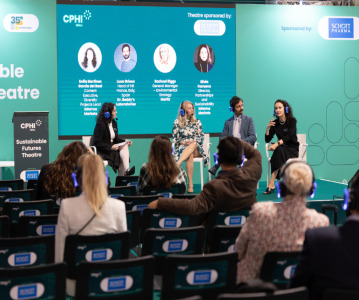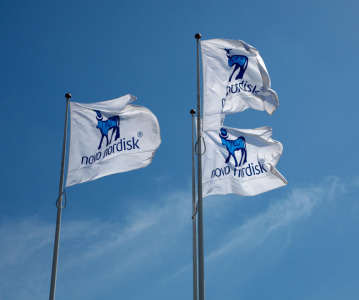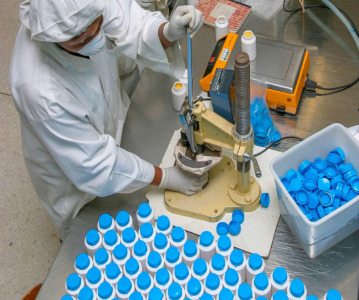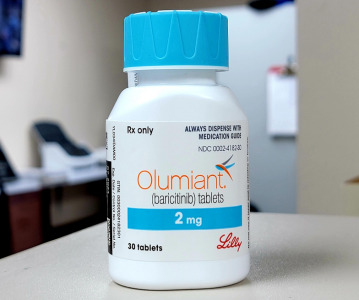CPHI Discover: Two-Tier Contract Market in China as Top CDMOs Grab all the Growth

Ahead of CPHI Discover (17-28 May, 2021) - global pharma's largest ever virtual gathering - we spoke to CPHI Annual Report expert Vicky Xia, China Head at BioPlan Associates on the biologics trends she is seeing emerging in the contract services space in China.
In the CPHI Discover webinar, China: Evolving Dynamics of the CDMO Landscape on Tuesday 18th May, Ms Xia will present extensive analysis on bio-opportunities in China alongside Dr Eric Sun, Vice President, Zhejiang Langhua Pharmaceutical, who will explore the small molecules market in the country.
The session “China: Evolving Dynamics of the CDMO Landscape” will chart the journey of the bio space in the region from returning scientists, to new regulations and the transformation of early CROs into global CDMO players.
Most importantly, Ms Xia (below) will address which companies and partnerships are best placed to harness the massive increase in domestic innovation seen in the last few years and how much growth we could see in the next five years.

CPHI: There’s been a lot of coverage of biologics growth in China over the next five years or so – do you perceive CDMOs in China primarily for domestic pharma or international supply?
VX: Primarily this growth has been driven by the domestic market opportunities. We have interviewed quite a few domestic biologics CDMOs and they are very interested in exploring global markets, but they are having difficulty gaining business, and it's quite challenging for them. WuXi Biologics have been an exception to this rule – they have overseas facilities in Ireland and have been quite successful in attracting global clients. Similarly, Pharmaron bought a facility in Europe recently with the goal of growing their international business. So overall, the perception among China-based CDMOs is that if they want to grow with big pharma clients in the USA and Europe, they need some local manufacturing in these markets.
CPHI: Similarly, international CDMOs that have built facilities in China such as Lonza and BI; are they building there to support the expanding biologics hub in China or is it to offer a lower cost base for big pharma projects?
VX: At the current stage they are expanding the CDMO market to support the ever-growing biologics market in China. For example, BI’s first client was BeiGene and they now have several other domestic biotech clients. WuXi Biologics has been the only one so far that has been very successful in attracting global clients, and many of the other CDMOs want to try and emulate WuXi’s success. A part of this success has been the available capacity, but also the fact they have a large global client base coming through from their discovery service business into clinical development. The IPO where they raised a large amount of capital has also helped further establish their status as China’s leading CDMO business.
CPHI: Do you perceive cell and gene therapy manufacturing as the natural next step? If so, when do you expect this to happen?
VX: Actually, it’s already happening in China! For example, Genscript is a CDMO, set-up by returnee scientists, that is specialised in cell and gene therapies. I would say that this is still a relatively small space compared to the size of the mAb market, but it is growing quickly, and at a faster overall rate. Genescript has actually been in existence for over a decade, starting out as a CRO, but seeing the growth, it opened up cell and gene therapy services around two-years ago. In China, there are now literally dozens of developers across the country, the majority of which are still in the very early stages of development and it makes sense that these innovators will use a CDMO to speed up the development process. But in maybe in two or three years’ time we might see the first new cell and gene therapies come to market in China.
CPHI: How big an impact has the Marketing Authorisation Holder (MAH) system had in China for both CDMOs and Innovators?
VX: It’s had a very large impact, allowing CDMOs to run commercial stage production for clients, but at present, I would say the majority of innovators have the preference for running their own in-house facilities once commercial – with CDMOs maybe operating as back up facility sites. But undoubtedly, without the MAH, the CDMO industry would be unable to grow the way it presently is. One thing we are seeing is the innovators increasingly using CDMO capacity to expedite development timelines before clinical production, often while they are building new in-house facilities.
At present we very much have a two-tier system for CDMOs. For the bigger CDMOs such as BI, Mabplex and WuXi Biologics, those with significantly global reputations, they are experiencing very good levels of business – and in fact the problem with these companies is often that clients have to wait for the facilities to become available, such is demand. Yet for the younger and small CDMOs the opposite is true, and they are having difficulty attracting and keeping clients.
CPHI: How do you foresee the CDMO business growing in the next 2-5 years both from a small molecule and large molecule perspective?
Prospects for the industry look very good. The next two to five years we will see CAGR of over 15% and there are more projects than ever before, with more products making it to clinical production. There have been around a dozen new mAb therapeutics from domestic innovators in the last two years, and we can expect these approval levels to double over the next five years with the wave of BLAs coming through. Over this time frame, I would still expect the biggest CDMOs to pick up the majority of the growth in contract services and ultimately China probably has scope for maybe six or seven large biologics CDMOs – but already there are dozens of contract operators and probably this means consolidation and the majority of growth in the top ten.
My view is that if these bigger CDMOs can continue to expand capacity the opportunities look very good, as they have the track record, reputation and experience.
CPHI: From a technological standpoint, do you have any perspective on how China-based CDMOs are building their manufacturing capabilities i.e. are they building new sites with modern equipment and does this mean they’re better prepared for future growth due to the demands of the industry?
VX: This is one of the strengths of China, that all new sites are built with new equipment rather than repurposing legacy sites, and as far as I know, all mAb CDMOs have been built new. In fact, there is also a high preference for single-use technology at CDMOs in China, and we also see several CDMOs exploring continuous bioprocessing to increase manufacturing efficiency. For example, WuXi and Transcenta are trying continuous bioprocessing platforms.
Global production for big pharma is still the aim of all CDMOs. But at the current stage, in my view, it is still going to be a little bit challenging for the CDMOs to offer truly global production for international pharma. More likely is that we will see China-based CDMOs used for regional production in China and in Asia.
Registration for CPHI Discover is now open and to get more information on the content sessions and exhibitors and speaker opportunities, please visit: https://www.cphi.com/discover/en/home.html

Related News
-
News Women in Pharma: Moving beyond discussions and into best practice at CPHI Milan
In this second CPHI Milan special of our monthly series, we cover the key takeaways from the Diversity & Wellbeing track held on October 10, 2024. -
News AstraZeneca invests in AI collaboration for cancer drug trials
The British-Swedish pharmaceutical giant is partnering with biotechnology firm Immunai Inc to increase the efficiency of some cancer drug trials. -
News Ozempic and Wegovy prices questioned as Novo Nordisk faces US Senate hearing
The CEO of Novo Nordisk was grilled during a US Senate committee hearing on September 24, 2024, in which the exorbitant prices of the Danish company’s blockbuster drugs Ozempic and Wegovy were called into question. -
News The BIOSECURE Act: implications for the pharma supply chain
On September 9, 2024, the US House of Representatives voted to pass the bill titled the BIOSECURE Act (the Act), which lists several Chinese companies in the pharmaceutical supply chain. The Act will prohibit American companies from contracting or doin... -
News On Track at CPHI Milan: Thermo Fisher Scientific Track Sponsor interview
With CPHI Milan just around the corner, we sat down with some of the sponsors for this year’s conference tracks to discuss the most pressing topics in pharma. -
News CPHI Milan Speaker Spotlight: Pharma Manufacturing and Localisation in Africa
In the run-up to CPHI Milan, we sit down with some of the experts and thought-leaders speaking at this year’s conferences. -
News US BIOSECURE Act passed by US House of Representatives
The controversial act, which has already impacted several foreign companies operating in the US, was passed by the House of Representatives on September 9, 2024. It is now headed for the US Senate before it can be signed into law by President Joe Biden... -
News Eli Lilly licenses rheumatoid arthritis manufacturing in Africa
American pharmaceutical company Eli Lilly has signed a partnership with Egyptian organisation Eva Pharma to localise manufacturing of rheumatoid arthritis treatments in Africa.
Position your company at the heart of the global Pharma industry with a CPHI Online membership
-
Your products and solutions visible to thousands of visitors within the largest Pharma marketplace
-
Generate high-quality, engaged leads for your business, all year round
-
Promote your business as the industry’s thought-leader by hosting your reports, brochures and videos within your profile
-
Your company’s profile boosted at all participating CPHI events
-
An easy-to-use platform with a detailed dashboard showing your leads and performance

.png)





